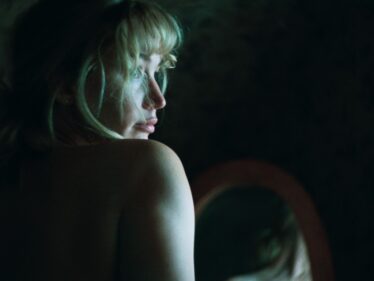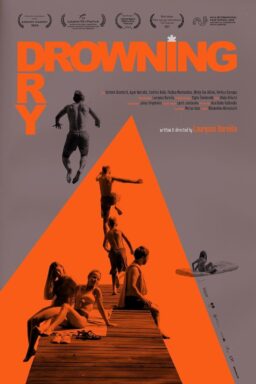At the very end of John Turturro‘s new film “Mac,” after all of the credits have rolled, there is a scratchy tape recording from a telephone answering machine. “John? John?” a voice asks, and then the voice complains about the whole idea of answering machines. The voice belongs to Turturro’s father, Nicholas, who died in 1988, and whose life as a construction worker and contractor inspired the film.
It is unlike most of the other films made in America today. It is about men who work with their hands, building houses. Most of the men in modern Hollywood movies work only as cops, criminals, lawyers, or drug dealers. Sometimes they are mad slashers, and more rarely politicians. They hardly ever earn an ordinary living doing hard work with their hands, the kind of work that many men of previous generations went off to do every morning of their lives.
In the movie, which opens Friday, Turturro plays a character loosely based on his father. He has two brothers, and they work on construction, building houses. It is the 1950s. Their father hammered it into them that if the job is worth doing, it’s worth doing right. Not everybody agrees with that–certainly not the slipshod contractor they’re working for. But the Turturro character doesn’t know any other way to work, and by the end of the film he is able to stand in front of an ordinary house on an ordinary suburban street, and tell his son, “I built that; that’s my house.”
The son in the movie represents John Turturro. The scene hit me with unexpected emotional force. My own father was an electrician for the University of Illinois, and one day he took me over to Memorial Stadium and showed me the electrical conduits, and told me, “I put those in.” Turturro’s film connects with the way a lot of people feel about the dues their parents paid.
“Mac” has been taking shape for more than 10 years, Turturro told me during a recent visit to Chicago. First it was a play, then a screenplay, and only after his success as an actor in several recent movies was he able to put together the financing to make it.
Turtorro has been appearing in movies since 1985, when William Friedkin gave him his first screen job in “To Live and Die in L.A.” He also had important roles in “Five Corners” (1988), as the neighborhood psycho who threatens Jodie Foster; “Miller's Crossing” (1990), as the leader of a local mob; and “Men of Respect” (1991), a New York gangster picture which was actually an update of Shakespeare, with Turtutto as MacBeth.
But his currently high profile came from three movies. He had the title role in Coen brother’s “Barton Fink” (1991), as a greenhorn Hollywood screenwriter. And Spike Lee has used him twice, memorably’ in “Do the Right Thing” (1989) he was son of the sons of Sal, the pizzeria owner. And in “Jungle Fever” (1991), he’s the local sandwich shop owner.
Turturro does not fit the traditional profile of a movie star. He’s kind of gawky and introspective. He’s effective playing rather simple characters, but then he’ll turn around and play somebody smart or very complex, and you realize appearances can be deceiving. As a first-time director, with “Mac,” he shows that he has a natural feeling for film.
The movie’s story line isn’t obvious (“This film isn’t based on other films,” he says), and many of the situations might be mundane in other hands, but Turturro knows how to handle actors and the camera. He doesn’t force the story into an artificial plot, or try to prove anything other than that everyday life, honestly lived, can have a certain nobility.
I asked him if he had a memory of his dad that summed him up. He did.
“This was when he was much older. I was going to Yale, and I was actually already writing this play. He got into a big argument with these wallpaper hangers at the Harley Hotel, over some very expensive wallpaper he had contracted to install. I was working with him that summer–the only time I had an office job with him, instead of manual labor. I had to find out everything that was wrong, make a punch list and get it corrected. This wallpaper was expensive because it was a very thick fabric. The job the hangers did was horrible. I had to tell him it would have to be replaced.
“The next morning I was in the construction office and I heard voices yelling. I went out to see what was going on and here was this big giant guy towering over my father, and the guy hauled off and hit my father. And I flew down the corridor and jumped on top of the guy and then all his guys jumped on top of me. And my father tried to rip this stuff off the wall and all these guys held him back. Five minutes later, he was totally fine. He was happy that I came to his rescue. But for him, it was like he was just standing up for and fighting for what was right.”
Turturro smiled, that grave smile.
“That’s how he was. He was the type of person who would respond to the situation. I remember I took him to see ‘To Live and Die in L.A.’ It was one of the first movies I was in, and it was one of those chi-chi New York screenings; even Andy Warhol was there. When I came on screen and I had that scene where Bill Peterson is chasing me, my father started yelling out, ‘Go, John, go! They can’t catch John!’ I’m saying, ‘Dad, be quiet.’ But he was looking at me like I was crazy. He’s having a good time. But that’s the way he would watch films; he would get very involved and if I watched “Viva, Zapata” one time, I must have watched it a thousand times. So he was a real film lover and a bit of an actor in his own right.”
Did he want you to be an actor?
“He wasn’t that happy that I was going into show business but once he saw me act, it was okay. He loved films passionately. He considered the big movie stars to be members of the family. We discussed them by their first names: Marlon, Burt, Kirk. Basically, he wanted me to be a doctor or a lawyer, because I had good grades.”
Yeah, that was my dad, too. He never wanted me to be an electrician. He told me about the professors he saw over at the university, with their feet up on their desks: “Now that’s the life for you!”
“Exactly.”
But at least he let you work beside him?
“Ever since I was 10 years old. I used to clean his houses, vacuum them before people moved in. And then one summer he let me knock out the side braces. I remember he was mad at me because I stepped on a nail and I had to go and take the shot. He said, ‘You’re costing me money’.”
So this really is your father’s story.
“There’s a lot of my father in this. It’s inspired by men like him. To me, he’s indicative of a lot of people from different backgrounds who tried to do the best they could do with whatever ability they had.”
In the film, Turturro’s camera stays close to the work itself. To the weather the men work in, the rain and mud, the glorious days, the hot summer days. To the building materials, and the camaraderie on the job, and the tensions at home, especially after the lead character decides to go into business for himself, and his brothers are not sure they will support him.
Turturro said he showed the screenplay for “Mac” to Martin Scorsese, when he was working in Scorsese’s “The Color of Money” in 1986.
“He really liked it. He told me I had to cut it, of course. I never stopped thinking it could be done but I think I was a little naive at the time. Which is good.”
Working with directors like Scorsese, Spike Lee, and the Coen Brothers, did you take notes? Watch how they directed?
“I saw that they all prepare, and they have rehearsals and they know what they want to do and it’s all personal. And it’s all their point of view. I guess I learned that you have to trust your own point of view and the story you want to tell. The first images that are in this film are some of the first things I had ever written.”
Has it changed life for you, being recognizable on the street as a movie star?
“I hope not, because I think the richest stuff you have to draw on is from the life around you. If you remove yourself from that, then you’re going to get so much narrower, and I think that it’s a real danger. I’d miss a lot of good moments. I was on the subway the other day and I saw this guy who had this bag, and he dropped it. No one bumped into him or anything, he just dropped it. And then he said, ‘A man doesn’t have a chance in this country!’ It was just so funny. Things like that get you thinking. So I hope the movie star thing never isolates me from real life. Or from taking the subway.”











